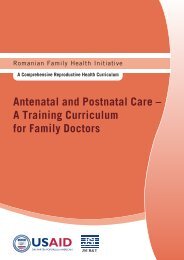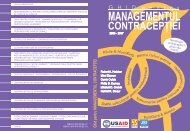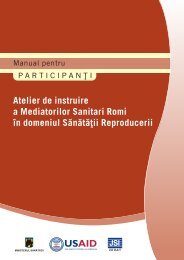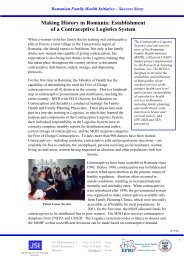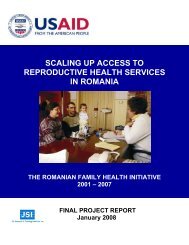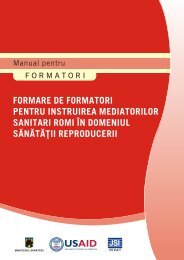Training of Roma Health Mediators in Reproductive Health
Training of Roma Health Mediators in Reproductive Health
Training of Roma Health Mediators in Reproductive Health
You also want an ePaper? Increase the reach of your titles
YUMPU automatically turns print PDFs into web optimized ePapers that Google loves.
Participant document<br />
HOW TO USE “INITIAL VISIT” SCREENING CHECKLIST<br />
A woman can use the method if her cycles are between 26 and 32 days long and if she<br />
and her partner can avoid unprotected sex dur<strong>in</strong>g the fertile days. This screen<strong>in</strong>g checklist<br />
will help providers determ<strong>in</strong>e if the woman and couple meet the method eligibility<br />
criteria. It beg<strong>in</strong>s with questions perta<strong>in</strong><strong>in</strong>g to the woman and then moves on to questions<br />
perta<strong>in</strong><strong>in</strong>g to the couple.<br />
Women with menstrual cycles between 26 and 32 days long<br />
The first section beg<strong>in</strong>s with questions that help the provider and the woman determ<strong>in</strong>e if<br />
she has regular cycles between 26 and 32 days long.<br />
1. Does the woman have regular cycles between 26 and 32 days? This question is<br />
designed to help the provider determ<strong>in</strong>e if the woman has cycles with<strong>in</strong> the range<br />
recommended for SDM users. The woman’s cycle length <strong>in</strong>cludes all days between the<br />
first day <strong>of</strong> her last period and the day before she expects her next period. Us<strong>in</strong>g a<br />
calendar the provider calculates the woman’s cycle length by mark<strong>in</strong>g the first day <strong>of</strong> her<br />
most recent period and the day she expects her next period. The provider then counts the<br />
days to establish the woman’s cycle length.<br />
Recommended Questions:<br />
- How <strong>of</strong>ten do you get your periods?<br />
- Do your periods usually come when you expect them?<br />
- When was the first day <strong>of</strong> your most recent period?<br />
- When do you expect your next period to start?<br />
- Do your periods ever come earlier or later than you expect them?<br />
All women will have some variability with their menstrual cycles. This question helps the<br />
provider determ<strong>in</strong>e if the woman frequently has shorter or longer periods. If the woman<br />
has more than more than one cycle out <strong>of</strong> the 26 to 32-day range per year, she should<br />
consider another method.<br />
If the woman does not remember the date her period started, estimate if her cycle is<br />
between 26 and 32 days long by ask<strong>in</strong>g:<br />
- Do your periods come about a month apart?<br />
- Do your periods come when you expect them?<br />
She must answer yes to both questions for the provider to establish that her cycles are<br />
between 26 and 32 days long. Hav<strong>in</strong>g periods about a month apart is a good <strong>in</strong>dicator that<br />
her cycles are with<strong>in</strong> the appropriate range.<br />
Women under special circumstances<br />
Providers should determ<strong>in</strong>e if the woman recently had a pregnancy, currently is<br />
breastfeed<strong>in</strong>g or us<strong>in</strong>g/has recently used a hormonal method <strong>of</strong> family plann<strong>in</strong>g, as these<br />
circumstances may affect cycle length. If any <strong>of</strong> these circumstances apply, ask her the<br />
questions perta<strong>in</strong><strong>in</strong>g to her special circumstance.<br />
93<br />
RFHI <strong>Tra<strong>in</strong><strong>in</strong>g</strong> <strong>of</strong> RHMs <strong>in</strong> <strong>Reproductive</strong> <strong>Health</strong> Session 5: SDM



